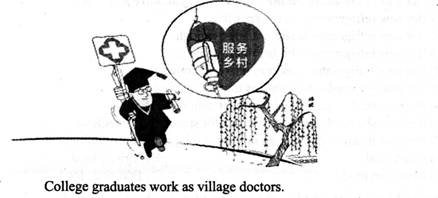2015хЙДшБшЏхчКЇшшЏцЏцЅфИчЛ(5ц8цЅ)
- чЌЌ1щЁЕяМчЛфЙ шЏщЂ
1ухЌщГщЂяМ
ц ЙцЎцхЌхАчх хЎЙяМхщЂу
AяМBuy his daughter new shoes.
BяМListen to his daughter's music
CяМRespect his daughter's opinion.
DяМHave a passion on music.
2уц ЙцЎфЛЅфИх хЎЙяМхчщЂу
New research shows girls who regularly have family meals are much less 36 to adopt all kinds of extreme weight control 37 , such as vomiting(хЌх), using laxatives (цГЛшЏ) or diet pills.
A study surveying more than 2,500 American high school students found that gifts who ate five or more family meals a week had a much healthier relationship with food in later life.
The research, published in international journal Archives of Pediatrics and Adolescent Medicine, polled students aged 13 to 17 in 1999 who were 38 up five years later. Regular family meals were found to have a protective effect 39 of the girls' age, weight, socio-economic status, dieting 40 or relationship with her family.
Experts say doctors should encourage families to have dinner at the table instead of on the couch in front of the television to 41 against serious eating disorders.
Belinda Dalton, director of eating disorders clinic The Oak House, said eating with family helped "no'mnalise (цЃхИИх) " young people's relationship with food.
" When adolescents are feeling that they're not coping they turn to something that they can control and food is something 42 and accessible for them to control. Clearly, if they're sitting with their family on a regular basis then their family can be more in control of their eating," Ms Dalton said.
"It's about, young people feeling connected with their family and that builds self-esteem and sense of worth and that can 43 very actively against someone developing an eating disorder. " An eating disorders expert, Kirsty Greenwood, said meal times were often difficult for sufferers. "It is 44 that they feel very ashamed of their eating habits and often won't eat with other people. Perhaps it's becausee they haven't 45 the importance of the family meal in their growing up," she said.
AяМavailable
BяМbehaviors
CяМexamined
DяМexperienced
EяМfavorable
FяМfollowed
GяМhabits
HяМlikely
IяМpotential
JяМprohibit
KяМprotect
LяМregardless
MяМtendencies
NяМtypical
OяМ0. work
3уц ЙцЎццяМхчщЎщЂу
Questions 12 to 15 are based on the conversation you have just heard.
AяМHe drives too fast.
BяМHis radio wakes her children up.
CяМHe plays his guitar too loudly.
DяМHis friends are too noisy.
4уц ЙцЎццяМхчщЎщЂу
Questions 16 to 18 are based on the passage you have just heard.
AяМTo explain a new requirement for graduation.
BяМTo interest students in a community service project.
CяМTo discuss the problems of elementary school students.
DяМTo recruit elementary school teachers for a special program.
5у
ц ЙцЎццяМхчщЎщЂу
You may choose a paragraph more than once. Each paragraph is marked with a letter. Answer the questions by marking the corresponding letter on Answer Sheet 2.
A University Degree No Longer Confers Financial Security
AяМMillions of school-leavers in the rich world are about to bid a tearful goodbye to their parents and start a new life at university. Some are inspired by a pure love of learning. But most also believe that spending three or four years at university--and accumulating huge debts in the process--will boost their chances of landing a well-paid and secure job.
BяМTheir elders have always told them that education is the best way to equip themselves to thrive in a globalised world. Blue-collar workers will see their jobs outsourced and automated, the familiar argument goes. School dropouts will have to cope with a life of cash-strapped (шЕщчДЇхМ ч) insecurity. But the graduate elite will have the world at its feet. There is some evidence to support this view. A recent study from Georgetown University's Centre on Education and the Workforce argues that"obtaining a post-secondary credential ( шЏфЙІ) is almost always worth it." Educational qualifications are tightly correlated with earnings: an American with a professional degree can expect to pocket $3.6m over a lifetime; one with merely a high- school diploma can expect only $1.3m. The gap between more- and less-educated earners may be widening. A study in 2002 found that someone with a bachelor's degree could expect to earn 75% more over a lifetime than someone with only a high-school diploma. Today the disparity is even greater.
CяМBut is the past a reliable guide to the future? Or are we at the beginning of a new phase in the relationship between jobs and education? There are good reasons for thinking that old patterns are about to change--and that the current recession-driven downturn (шЁАщ) in the demand for Western graduates will morph (цЙх) into something structural. The strong wind of creative destruction that has shaken so many blue-collar workers over the past few decades is beginning to shake the cognitive elite as well.
DяМThe supply of university graduates is increasing rapidly. The Chronicle of Higher Education calculates that between 1990 and 2007 the number of students going to university increased by 22% in North America, 74% in Europe, 144% in Latin America and 203% in Asia. In 2007 150m people attended university around the world, including 70m in Asia. Emerging economiesтspecially China--are pouring resources into building universities that can compete with the elite of America and Europe. They are also producing professional- services firms snch as Tata Consulting Services and Infosys that take fresh graduates and turn them into world-class computer programmers and consultants. The best and the brightest of the rich world must increasingly compete with the best and the brightest from poorer countries who are willing to work harder for less money.
E. At the same time, the demand for educated labor is being reconfigured (щцАщ
чНЎ) by technology, in much the same way that the demand for agricultural labor was reconfigured in the 19th century and that for factory labor in the 20th. Computers can not only perform repetitive mental tasks much faster than human beings. They can also empower amateurs to do what professionals once did: why hire a flesh-and-blood accountant to complete your tax return when Turbotax (a software package ) will do the job at a fraction of the cost? And the variety of jobs that computers can do is multiplying as programmers teach them to deal with tone and linguistic ambiguity.
F.Several economists, including Paul Krugman, have begun to argue that post-industrial societies will be characterized not by a relentless rise in demand for the educated but by a great "hollowing out", as mid-level jobs are destroyed by smart machines and high-level job growth slows. David Autor, of the Massachusetts Institute of Technology (MIT), points out that the main effect of automation in the computer era is not that it destroys blue-collar jobs but that it destroys any job that can be reduced to a routine. Alan Blinder of Princeton University, argues that the jobs graduates have traditionally performed are if anything more "offshorable" than low-wage ones. A plumber or lorry-driver's job cannot be outsourced to India. A computer programmer's can.
G. A university education is still a prerequisite for entering some of the great industries, such as medicine, law and academia (хІцЏч), that provide secure and well-paying jobs. Over the 20th century these industries did a wonderful job of raising barriers to entry--sometimes for good reasons (nobody wants to be operated on by a barber) and sometimes for self-interested ones. But these industries are beginning to bend the roles. Newspapers are fighting a losing battle with the blogosphere. Universities are replacing tenure-track professors with non-tenured staff. Law firms are contracting out routine work such as"discovery" (digging up documents relevant to a lawsuit) to computerized-search specialists such as Blackstone Discovery. Even doctors are threatened, as patients find advice online and treatment in Walmart's new health centers.
H.Thomas Malone of MIT argues that these changes--automation, globalizafion and deregulation--may be part of a bigger change: the application of the division of labor to brain-work. Adam Smith's factory managers broke the production of pins into 18 components. In the same way, companies are increasingly breaking the production of brain-work into ever tinier slices. TopCoder chops up IT projects into bite-sized chunks and then serves them up to a worldwide workforce of freelance coders.
I.These changes will undoubtedly improve the productivity of brain-workers. They will allow consumers to sidestep (шЇщП ) the professional industries that have extracted high rents for their services. And they will empower many brain-workers to focus on what they are best at and contract out more tedious tasks to others. But the reconfiguration of brain-work will also make life far less cozy and predictable for the next generation of graduates.
The creative destruction that has happened to blue-collar workers in the past also starts to affect the cognitive elite.
6уQuestions 19 to 21 are based on the passage you have just heard.
AяМYour heart rate is lowered.
BяМIt becomes harder for you to relax.
CяМYou become too tired to sleep.
DяМYour sleeping rhythms are disrupted.
7у
хчщЂ
Hereтs a case study for would-be MBAs to considerяМthe success of H MartяМan international supermarket chain based in New Jersey(theтHтin H Mart stands for Han Ah ReumяМwhich meansтone arm full of groceriesтin Korean)яМTlle first H Mart opened in QueensяМNew York in 1982яМas a corner shopяМNow there are stores in 11 statesяМCanada and BritainяМA new one recently opened in CambridgeяМ
MassachusettsяМan affluent city outside BostonяМ
The future looks bright for Asian supermarkets like H MartяМEamings of Asian-American households outpace the American averageяМTheir spending exceeds all other groupsяМtooяМaccording to GeoscapeяМa consultancyяМAnd they spend more of their money on groceries than the average America householdяМBut Asian delicacies can be hard to come byяМfew Americans are likely to see durian or bamboo shoots in their local shopяМSome specialty ingredients are only to be found at a premium(щЋфЛЗ)in up-market grocery storesяМor miles away,in ethnic markets in older Asian neighborhpodsяМ
Americans have developed greater appetite for cooking and eating Asian foodsяМt00яМIn 2012 nonяМrestaurant sales of Asian foods topped $1яМ5 billionяМaccording to Mintel GroupяМa marketяМresearch firmяМThough Latin foods are a bigger marketяМthe popularity of Asian foods is growing fasterяМOnce strangeяМseeming imports like seaweed and sashimi are now fashionable eatsяМThough the rate of growth is expected to fallяМsales are likely to keep risingяМ
Yet most Asian grocers have not made efforts to reach new customersяМsays Jeffrey CohenяМan analyst at IBIS World,an industries watcherяМMany shops are located in minority enclavesяМand do little to market themselves to other AmericansяМCramped car parks and dingy interiors fend off customers used to the bright fluorescence(шЇх
)of mainstream supermarketsяМIngredients labeled with poorly-translated English Can leave shoppers bamedяМ
A few Asian grocery chains have caught onяМopening stores in more diverse suburbsяМpaying attention to cosmetic niceties(чЛш)and marketing more widelyяМOther than H MartяМthere are Califomian chains such as 99 Ranch Market and Shun Fat SupermarketяМwhich have been expanding to the American southwestяМThe former was even featured in a humorous YouTube music videттAsians Eat Weird Thingsттwhich has attracted more than 900яМ000 hitsяМThose weird things may not seem so weird after allяМ
What makes the future ofAsian supermarkets so bright?
AяМHigh income and spending ofAsian-AmeriCallsяМ
BяМHigh income ofAsians and unreachable Asian foods in local American shopsяМ
CяМHigh expenditures of Asians on groceryяМ
DяМLow earnings of the other groupsяМ
8ухЌщГщЂяМ
хчщЂяМ
щЎщЂ
AяМSee a doctor about her strained shoulderяМ
BяМUse a ladder to help her reach the teaяМ
CяМReplace the cupboard With a new oneяМ
DяМPlace the tea on a lower shelf next timeяМ
чЎчщЂ
9уYou should start your essay with a briefdescription of the picture and then express your views on the problem oftrust crisisяМ

хфНхЏМшЊ
1яМчЎшІцшПАхОчяМцхКфККфЛЌфЙщЎчМКхАфПЁфЛЛцЏфИчЇфИшЏчЄОфМчАшБЁяМфМфКЇчфИЅщхцяМ
2яМфЛцПхКучЄОфМцКц(хЊфНххІц Ё)хфИЊфККфИфИЊхБщЂхКхщшПАфКшЇЃхГхцГ;
3яМшПшЁцЛчЛяМхЛКшЎЎфККфЛЌфЛфИЊфККхшЕЗяМшАЈхАц хОЎяМцщЋшЏфПЁцшЏу
10у

| ПЮГЬзЈвЕУћГЦ | НВЪІ | дМл/гХЛнМл | УтЗбЬхбщ | БЈУћ |
|---|---|---|---|---|
| ЁЖДѓбЇгЂгяЫФМЖЁЗОЋЦЗАрЃЈАќРЈгяЗЈЁЂДЪЛуЁЂЗвыЃЉ | ЖЁбЉУї | ЃЄ100 / ЃЄ100 |  |
БЈУћ |
| ЁЖДѓбЇгЂгяЫФМЖЁЗОЋЦЗАрЃЈдФЖСРэНтЃЉ | ЖЁбЉУї | ЃЄ100 / ЃЄ100 |  |
БЈУћ |
| ЁЖДѓбЇгЂгяЫФМЖЁЗОЋЦЗАрЃЈЬ§СІЃЉ | ЖЁбЉУї | ЃЄ100 / ЃЄ100 |  |
БЈУћ |
| ЁЖДѓбЇгЂгяЫФМЖЁЗОЋЦЗАрЃЈаДзїЃЉ | ЖЁбЉУї | ЃЄ100 / ЃЄ100 |  |
БЈУћ |







